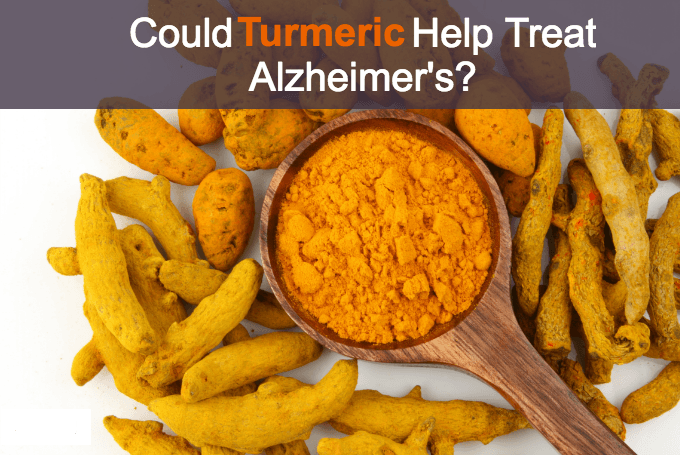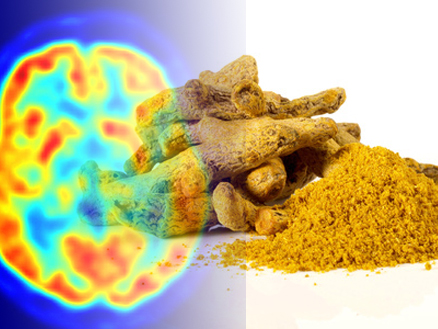Q. Curcumin for Alzheimer’s?
This Indian Superfood May Potentially Cure AD!!

Not a lover of Indian food? This blog might drift your mind. Many research studies have found that a compound in turmeric, CURCUMIN: the spice that offers golden colour to curry – could facilitate an improvement in memory and mood changes of older adults.
Derived from the Curcuma longa plant, Curcumin is a key constituent of Turmeric and has been used widely in traditional medicine. Turmeric has been associated with a richness of health benefits. Research studies have claimed the worth of this popular spice in treating stroke and Alzheimer’s disease. In fact the Turmeric root looks very much similar to the ginger root. It is the Turmeric root which is used as a spice and medicine, either fresh or dried and ground into a powder. Curcuminoids are the chemical compounds present in Turmeric that delivers a characteristic yellow colour to Turmeric.
The presence of a compound called Curcumin in Turmeric makes it so special; Curcumin is a known antioxidant, signifying that it can defend your body cells against damage resulting from free radicals. In addition, it exerts strong anti-inflammatory properties and helps in protecting the brain. Some studies propose that Alzheimer’s disease and mood disorders may be controlled by brain inflammation. Thus, Curcumin improves mood disorders by reducing the brain inflammation. It improves memory in middle-aged adults and even checks out the development of neurological disorders including dementia (AD starts as an inflammatory progression in the brain).

Curcumin possesses meaningful cognitive benefits and exerts positive effects on improvement of memory of a person. What is more, Curcumin is proven to lower the levels of tau and beta-amyloid in the amygdala and hypothalamus, areas in the brain that play an important role in regulating memory and emotion. And this way, Turmeric protects the brain from the onset and the progression of Alzheimer’s disease. The lipophilic nature of Curcumin permits it to cross the blood-brain barrier.
Turmeric has been known as a super spice as well as a super food. Apart from antioxidant and anti-inflammatory benefits, Turmeric also owns effective pain reliever, and cancer-protective properties; also found helpful for treating health conditions such as post-menopausal osteoporosis, liver cancer, and acute respiratory distress syndrome. Also, it can lower the bad cholesterol levels and protect your cardiovascular system. Remember that Turmeric also comprise many other compounds in addition to Curcumin responsible for other uses. One of the best things regarding the use of Turmeric for its health benefits is that the most prominent side-effects may be somewhat bitter but not disagreeable after-taste and that wonderful yellow-orange tinge that can be challenging if permitted to diffuse.
Turmeric in Alzheimer’s:
It greatly helps in improving the behavioural and psychological symptoms of dementia. Studies have confirmed that Curcumin helps the patients with anxiety, agitation, bad temper, and droopiness. Turmeric amazingly recovers their ability to manage the aforesaid signs and symptoms, in fact a positive sign of progress.
Mode of action:

About Alzheimer’s disease (AD):
The most common form of dementia, a broad term for memory loss as well as cognitive decline is AD. It has an effect on person’s memory, behaviour as well as thought process. While the progressive cognitive decline is overwhelming, the most disappointing part of Alzheimer’s is it is currently permanent and irreversible. AD is the 6th leading cause of death in the United States; people who are diagnosed with Alzheimer’s are able to survive for an average of 8 years after signs have become visible. The noticeable modifications in the brain associated with AD crop up years before there are any symptoms of the illness.
Those with this memory disorder still experience happiness and joy, regardless of their augmented confused state. The intellectual impairment grows slowly and steadily from intermittent absent-mindedness to total disability. Initially, the person may appear a little scatterbrained; after that, he may experience a greater complexity in learning new skills or even speech problems. As the problem progresses, the task of caring of AD patient become increasingly challenging. With the progression of AD in your loved one, you will be required to gain knowledge of a set of skills that will take time and patience to develop. With a little enthusiasm and the keenness to understand, you will be capable of providing your dear one with the care they require and deserve.


Knowing The Signs of Alzheimer’s Disease:
Below listed are the 10 symptoms of Alzheimer’s disease provided by The Alzheimer’s Association:
 Memory loss that interferes with daily life
Memory loss that interferes with daily life- Changes in mood and/or behaviour
- Trouble while completing daily tasks
- Difficulty in the perception of relationships
- Perplexing places and/or times
- Reduced/reduced judgment
- Issues with words while speaking and writing
- Withdrawal from work and/or social activities
- Misplacing things
- Poor problem solving
A serious memory loss is never a usual part of aging. If you observe any of these symptoms in yourself or a dear one, remember to look out for a proper medical advice. The good news is that there are natural treatment options for Alzheimer’s that can successfully improve this condition. And CURCUMIN is one of them. Just reap in the therapeutic benefits of “CURCUMIN” in curing AD.

@@@ Come join hands with HealthDiva and together we can end ALZHEIMER’S now… HealthDiva wishes you health and happiness!!



